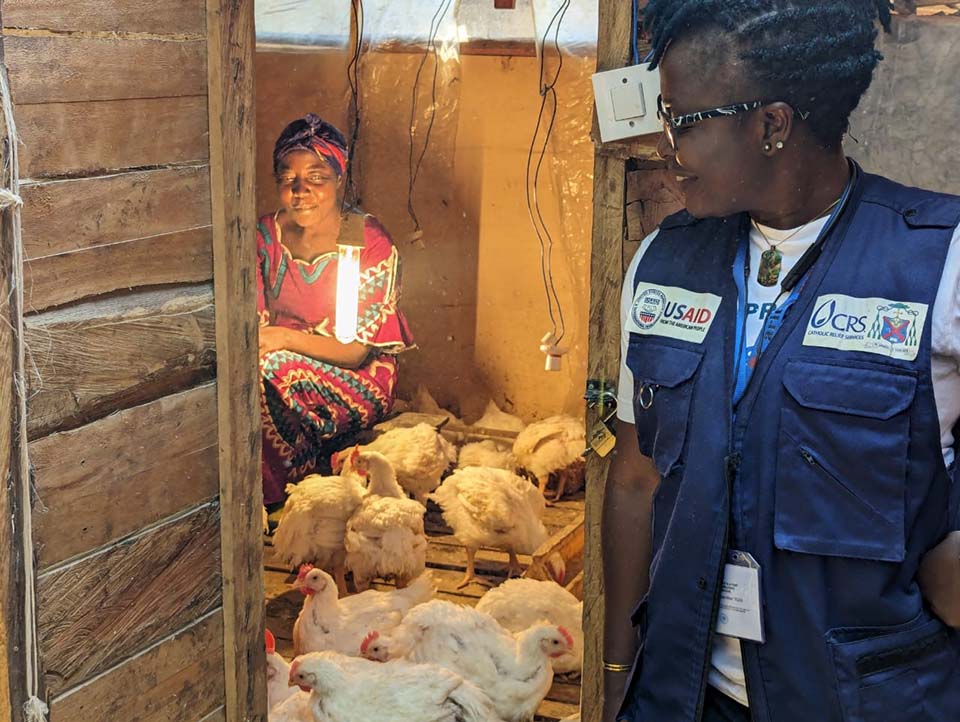
Learning Business Skills in Cameroon
For more than 20 years, Caro Lumsifu worked at home. She would wake up every morning at 5 a.m. to prepare breakfast for her husband and children. Once her husband left for work and the children went to school, Caro cleaned and cooked for her family at their home in Bamenda, Northwest Region of Cameroon.
In April 2021, Caro’s life took a tragic turn when her husband fell sick and died after a brief illness.
“It was a very difficult moment for me,” she says. “After my husband died, life became so hard, especially because he was the breadwinner of the family.”

A Caritas staff member with as Caro Lumsifu as she watches over her growing chicks.
Photo by Colette Mbunwe for CRS
Caro was unable to afford school fees and provide for her family. Her two children were forced to drop out of school, and she sent them to live with a relative who could better care for them while she looked for work.
Caro started experiencing backaches shortly after her husband’s death.
“The pain was so intense that I could barely lift any weight,” she says. “I went to the hospital in February 2023 and the doctors said I have a spine injury.”
The backache made it difficult for Caro to provide for herself and her family because she could not do any hard labor, such as farm work.
Two years after her husband’s death, a team from Catholic Relief Services partner Caritas came to the Bafut village to identify and register people displaced by conflict and residents who were living in vulnerable conditions as part of the U.S. Agency for International Development-funded Anglophone Crisis Emergency Response project, or ACER. Caro was selected as a participant and she received an electronic voucher, which she used to purchase rice, potatoes, palm oil, cooking oil, a mattress and a cooking pot.
“This food assistance has restored my dignity,” Caro says. “I was very excited when I was chosen as a participant for the project. The food I have received is of much help to me and my family."
Caro also learned basic poultry-rearing and business skills. She also received a chicken coop, 43 chicks, waterers, feeders and feed from the project to kick start her poultry raising business. After making her first sales, Caro reinvested the money.
She bought 70 chicks to breed on her own. Caro follows the vaccination calendar for her chicks, and she partners with her neighbor who is an experienced poultry farmer to improve her breeding skills.
Caro is now growing her third batch of chicks, and she plans to expand her poultry business in the future. She intends to start supplying chicks to poultry farmers in her community.
“Poultry farming is something I have dreamed of doing,” says Caro. “I had no money to start this business. This assistance has helped me achieve my dream.”
Caro’s hope is to be able to make enough income to send her children back to school and bring them home to live with her.
Funded by the Bureau for Humanitarian Assistance of the U.S. Agency for International Development and implemented by CRS in collaboration with the Archdiocese of Bamenda, the Anglophone Crisis Emergency Response IV project is responding to the basic needs of 10,800 vulnerable internally displaced persons and host families in 19 communities affected by the ongoing crisis in Cameroon’s English-speaking regions. So far, households have received three rounds of monthly food assistance and a one-time credit to purchase household supplies. Over 100 households also received training on basic poultry raising to launch poultry-raising businesses to help them become more self-sufficient. Over the past four years, CRS, and the local archdiocese have provided emergency assistance to more than 100,000 people in the Northwest thanks to funds from USAID and BHA.

